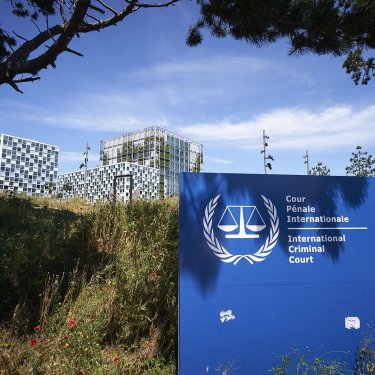RSF files third complaint with the International Criminal Court about deliberate Russian military attacks on journalists

Since the beginning of the war in Ukraine, Russian forces have deliberately fired on at least eight journalists or media crews. Reporters Without Borders (RSF) has filed a third complaint with the International Criminal Court.
RSF submitted a third complaint to the ICC's chief prosecutor on 25 March refering to the case of a Ukrainian fixer detained for nine days, tortured by Russian forces and whose testimony was revealed by RSF on 21 March.
Submitted on March 16, RSF’s second complaint calls on the ICC’s chief prosecutor to investigate crimes committed against journalists by the Russian armed forces in the course of the war in Ukraine. At least eight journalists or media crews have been deliberately targeted by Russian forces or have been the victims of indiscriminate bombardment.
A follow-up to the first complaint submitted by RSF on 4 March about Russian attacks on television towers, this second complaint also provides information about new attacks on television towers.
“We are seeing an increase in Russian attacks deliberately targeting journalists,” RSF secretary-general Christophe Deloire said. “The intention to kill has been clearly established in several cases so they can only be classified as a war crime. As journalists are protected by international law in times of conflict, it is time for the ICC prosecutor to demonstrate that this protection is not an empty word. RSF will make every effort to ensure that these crimes are investigated, prosecuted and punished.”
There have been more and more deliberate attacks against journalists since the start of Russia’s invasion of Ukraine on 24 February: a British Sky News TV crew was targeted by Russian fire near Kyiv on 28 February; a Czech team of Voxpot media car came under fire in Makariv on 3 March; Swiss journalist Guillaume Briquet was targeted by sniper fire between Kirovograd and Nikolayev on 6 March; an Al Araby TV crew was targeted by sniper fire on 8 March; and Ukrainian journalist Victoria Roshchina's car was the target of gunfire on 9 March.
In each of these cases, the journalists were clearly identifiable as such. RSF is able to confirm that the shots deliberately targeted the journalists and that they came from Russian forces. RSF was able to obtain statements from the Al Araby journalists and from Guillaume Briquet, and forwarded them to the ICC prosecutor.
Other attacks have taken place that RSF has solid reasons to believe were committed by the Russian army although it has not been able to formally establish it. They include the deliberate shooting attack on 26 February in which two journalists with the Danish newspaper Ekstra-Bladet were badly injured; the shooting that killed US journalist Brent Renaud on 13 March; and the attack on a Fox News crew on 14 March that killed French-Irish cameraman Pierre Zakrewski and his Ukrainian colleague Oleksandra Kuvshynova, and badly injured the US journalist Benjamin Hall.
Journalists are considered civilians under international law and are protected persons. Deliberately attacking them is a war crime. In view of the number of attacks against journalists in Ukraine and their repetition, it is reasonable to conclude that these attacks were carried out in application of a plan or a policy, or that they were carried out on a large scale, reinforcing the grounds for treating them as a war crime.
The same applies to the latest attacks on television towers cited in the complaint. After the attacks on four towers from 1 to 4 March, two more television towers have been targeted – in Kharkiv and Bilopillia.
Ukraine is ranked 97th out of 180 countries in RSF's 2021 World Press Freedom Index while Russia is ranked 150th.



